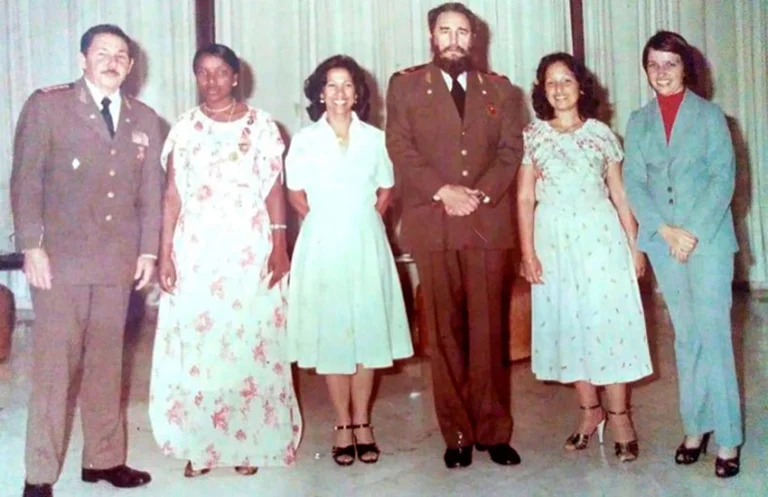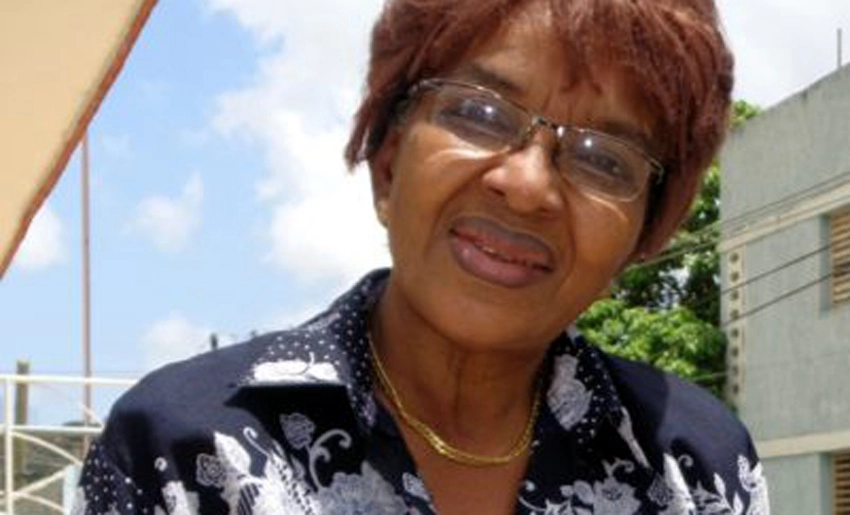The Story of Isidora Gordon Benjamin is filled with sacrifice, anecdotes and experiences, some so deep that they have left hard to forget prints in her heart; others so beautiful that she will always remember them.
Nursing is her passion, a vocation she seems to have been born for, who has dedicated 55 years of her life, and that she has fully abandoned to, despite being in her seventy’s and that she doesn’t seem to get rid of.
For this woman, originally from Holguin province, having accomplished an internationalist mission while Angola was fighting to preserve her independence, meeting with Comandante Fidel Castro Ruz, having worked tirelessly while leading the Nursing Union in Holguin, do it all to keep active the presidency along decades of the Cuban Nursing Society in this northeastern territory, are some of the arguments that moved her to get a diploma degree on Information Sciences, on the suggestion of Nathalie Romero Perez, who asked her to conceive a bio-bibliography for the final exam. The recent presentation of her life story, this 18 of September, brought with it an amusing talk with Gordon Benjamin.
How does Isidora Gordon Benjamin assume to be the source of inspiration for a life story?
“For several years different people had proposed me to write my life story, perhaps because of a cultural problem I did not see it as something that should be, I do not feel worthy of that privilege. Some years ago I decided instead of telling my story, to write the history of Nursing in Holguin and it seems to me that with this book I am going to fulfill the request made by Miguel Cano Blanco and Jorge Luis Sierra Cruz”.
As for the book of The History of Nursing in Holguin, how long did it take you to write it?
“I consider that history is very important for the formation of our human resources. We have the need, besides publishing the book, to gather in it all the moments through which the nursing in Holguin has gone through, the actions, activities carried out inside and outside the country in several moments. And the value of Nursing has to be collected. I think it is extremely important for the formation of the new generation.
“For more than three years I started to write it, every time we have the proposal almost finished, we realize that we are still missing aspects. Recently we had a meeting with retired nurses, who worked at the Civil Hospital of Holguin, with a career, a history that could not be left out of this book, for being founders of this profession. Among them is Magaly Aguilera, an anesthesiologist nurse who has four internationalist missions, internationalist combatant, of the Rebel Army.
“When reviewing the book, one realizes that it is a very good product for the formation of resources. In addition, this book also gives more public recognition to the work of nursing personnel, whether they are men or women. The latter is very important because there is often a lot of talk about medical personnel and other types of personnel, but nursing personnel are almost always relegated to second place. So this book also recognizes that work.
How did Isidora decide to become a nurse?

“I saw in this specialty the way to settle my own debt with the Revolution and with the Castro family. I was born in Biran, specifically in the community of Biran-Castro, my parents, originally from Jamaica, arrived there and asked Angel Castro for a job. When the Revolution triumphed I had the opportunity to go to Havana to study, they put me at Camilo Cienfuegos school. I had to return because of family problems, to take care of my father who had lost his sight. I thought that the best way to pay off my debt was to become a nurse and that’s what I did”.
Of the anecdotes you have experienced as a nurse, is there one that has marked your life professionally?
“One of the experiences I remember was when I was in Angola, during the war, on the front lines. Every day before leaving for the battle front, we looked at each other and counted each other to find out at the end of the day who had fallen in combat. During my stay there one terrible day we went out and found a mass grave full of burning, dying children. We immediately picked them up and began to take those who were still alive and hid them where we lived. There we cured them with whatever we could.
“Later, at the end of the mission, those children who had been amputated wanted us to bring them with us because many of them were left alone, without a family. How could they stay in Angola? And that was very hard, very sad, because there was nothing there to deal with the social problems. We said goodbye to them, satisfied that at least they were alive.
“There were 12 children we were able to save. There in a mass grave. That marked me. After coming here I learned that they were taken care of by the Cuban brigade that remained there. But it was hard to live an experience like that and not remain marked.
“Later I had another experience which was an ambush that they made on us and Silvio Rodríguez was with us where he was wounded and I had to take care of him until the plane arrived to transfer him”.
Do you think the future of nursing in Holguín is guaranteed with the new generations?
“I have noticed the potential of Nursing in the province of Holguin, how the graduated personnel have been preparing themselves, how they have been raising their scientific level, how they have been participating in researches that have allowed them to achieve the highest categories. And I think so. We realize the potential that it has for training, how nursing has been able to reach families.
“We work on a group of processes such as respectful childbirth. From the moment you arrive at the health center with your partner, with your family, how you are accompanied until the moment of delivery. I think we are on the right path, regardless of the fact that the health situation is well known, with the lack of a significant number of resources, but we, the nursing staff, have to accompany and contribute”.
Undoubtedly, nursing came into Isidora Gordon Benjamin’s life to stay. This career, which she began as payment for what she considered a debt to the Revolution, became an innate taste, an enjoyable task, a help she offers to be useful to society.
- The 4th edition of the Master’s Program in Natural Medicine will begin in Holguin - 16 de January de 2026
- Blood Bank Inaugurated at Holguin Military Hospital - 15 de January de 2026
- Holguin Cancer Center Plans to Incorporate Endoscopic Surgery in Urology - 14 de January de 2026

